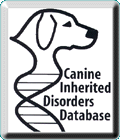
Ectropion
Ectropion is a defect of conformation in which there is a sagging or rolling-out (eversion) of the eyelids. This results in abnormal exposure of the eye, which often leads to irritation.
It is likely that ectropion is influenced by several genes (polygenic inheritance) that affect the skin and other structures that make up the eyelids, and that affect the way the skin covers the face and head.
Because of increased exposure of the eye, dogs with ectropion are prone to develop allergic or bacterial conjunctivitis - inflammation of the thin membrane which covers the periphery of the surface of the eye and lines the eyelids. Affected dogs may develop keratoconjunctivitis sicca because of reduced efficiency at wetting and cleaning the cornea.
Dogs who have had surgical correction for a defect such as ectropion are prohibited from exhibition in the show ring.
In addition to the sagging of the eyelids, dogs with ectropion commonly have a mucopurulent discharge in the eye, reddening of the exposed conjunctiva, and decreased tear production. To check the latter, your veterinarian will do a Schirmer tear test.
With mild entropion, no treatment may be necessary. If secondary problems such as conjunctivitis develop, these are treated as required.
More severe ectropion can lead to chronic problems associated with eye irritation. In these cases, surgery is performed to remove a small wedge of tissue from the margin of the eyelid.
Ectropion is one of the eye conditions that is a result of selection by breeders and a demand by the public for such features as excessively prominent eyes and heavy facial folds. A responsible breeding programme will choose animals for breeding with a more normal head conformation, so as to select away from these exaggerated facial features and the problems associated with them.
FOR MORE INFORMATION ABOUT THIS DISORDER, PLEASE SEE YOUR VETERINARIAN.
- Bull terrier
- Chow chow
- Clumber spaniel
- English setter
- English springer spaniel
- Great Dane
- Great Pyrenees
- Labrador retriever
- Mastiff
- Neapolitan mastiff
- Newfoundland
- Saint Bernard
- Shih tzu
- Basset hound
- Bloodhound
- Boxer
- Cocker spaniel, American
- Cocker spaniel, English
- Gordon setter
- Curly coated retriever
- Dalmatian
- Irish setter
- Disorder Type:


